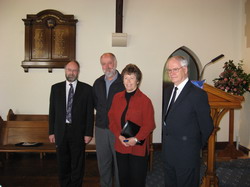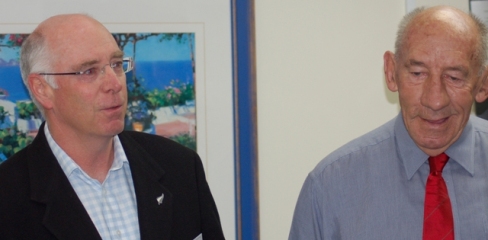An immigrant looks back at twenty years in New Zealand Changing countries for a husband’s career can mean major changes for his wife.
Dorothy – 24/09/04
Margit talked to me about migrating to another country because of her husband’s career and about having to change her lifestyle and interests so that she could cope in her new circumstances. She talked with such infectious vitality that I felt grateful that such a woman had the adaptability to fit in here – a bonus for her adopted country. I wish I could convey the sound of her voice as well as the substance of her words.
Changing countries was in Margit’s blood. Her grandparents had migrated from Germany to Brazil. Her parents went back to Germany where Margit grew up. They were not surprised when she left home to work in London and then New York. It was in New York that she met and married Denis. He too was a traveller, having lived in California and India before entering graduate school.
Years in the USA followed by move to Christchurch, New Zealand After Denis finished his studies in California his first job was in Michigan where they stayed for eleven years. After eight or nine years they began to think of moving. Denis owns and edits the Journal of Philosophy and Literature. A professor who was a contributor to the journal wrote to Denis saying that there was job at the University of Canterbury which needed exactly Denis’s specialty, but of course he realised that they would not think of coming to New Zealand. Margit and Denis thought New Zealand did not sound as bad as that, so they headed to the library to read about the country. They gained some impressions of the place – not all accurate as the books had been published in the 1950s!
Though the professor expressed surprise that they were interested – which was a little disquieting – they came to Christchurch to give it a year’s trial. Denis had the option of returning to his position in Michigan after a year , but they decided to stay a bit longer – which has turned out to be twenty years!
While in California Margit worked in the university library at Santa Barbara, but no similar job was available when they moved to Michigan. She and Denis wanted children and while in Michigan they had a daughter and a son . Their move to New Zealand was partly motivated by their belief that it was a good country in which to bring up their children.
“I had built up a new career for myself in Michigan,” Margit explained. “Knowing that for the next few years I would want to be at home I started work on my book German Pastry Bakebook. Writing it took two years, but it was the beginning of a ten-year career. I ran pastry classes, had my own cooking show on television and wrote articles about food for newspapers and magazines. I really enjoyed it.
“I thought I would very easily be able to do the same in New Zealand because of my credentials. That was my disappointment. Twenty years ago people didn’t think much about food here. It wasn’t very fashionable to do things outside of ‘meat and three veg’. Also I found that when I sent my book and articles I had written, the cooking instructors in New Zealand did not wish to know me. It was rather a closed shop.”
For the first year she and Denis were busy setting up things in the new place, but after that Margit began to feel unhappy and needed a challenge.
“I thought, ‘Why did I come here?'” Margit said.
“Then the same professor who had invited us to come here made a suggestion.
“‘Why don’t you go back to University? You started once and you discontinued it. Why not go back and finish it? Now you have the time to do it.’ His suggestion gave me the push I needed and I started again from the beginning. I did it half time and in six years I completed a B.A. I took Political Science to Stage Three in the first three years, but then as I wanted to read a lot and have fun I majored in German literature.
“I applied for some jobs but although I was the second choice for several positions I was not appointed and I felt that I had lost out because of my accent. That was a bit hard. I came to realise that when you have that difficulty you can really only work in places where your accent does not matter – and the university library was one of those places! It is different from the business environment where employers are concerned that I won’t be understood on the telephone. I ended up working in the University of Canterbury library, and I’ve been very happy there for almost ten years.”
Her accent caused another disappointing setback for Margit. She planned an ethnic cooking radio programme. She was told that it was a fantastic idea and she had done a good job, but she could not be the presenter. She told them firmly that her material was not available for someone else to present.
“Sometimes you feel that you are not wanted. Those with a thicker skin can talk about it and laugh about it, but others just have to leave,” said Margit with a laugh.
“To improve your accent you have to be interested in the language, have a great desire to succeed in your new country and have patience with yourself. Sometimes learning a language does not come just naturally. You mustn’t be shy about using your new language even if making mistakes.
“When we arrived twenty years ago life here was a bit unsophisticated. Things have changed a great deal for the better. Food now comes in a huge variety, clothes are so much more fashionable and I never have the feeling that geographically we live at ‘the end of the world’. Men no longer go to work wearing shorts and walk socks to the knee, but surprsingly I now quite miss seeing them! People said to me when we came that it was much better then as years earlier there were only two types of cheese – mild and tasty. I think I would have felt very deprived.”
Margit was surprised at first by the rising inflections so commonly used at the end of sentences by women and children. She was also struck by the way women used tag questions, as in ‘That’s a delicious pie, isn’t it?” There is a theory that both these features of women’s communication were a result of a lack of confidence and a sense of inferiority. She was also intrigued by the expression ‘as good as gold’ which she had not heard before. That too, she says, is not heard often now.
She also felt when they first came that everyone else spoke more quietly than they did, but now people seem to speak out more confidently and ask a lot more questions. In past years fewer Kiwis had travelled overseas, but now many people have become great travellers. As a result Kiwis are better informed about world issues and seem more tolerant of other ethnic groups. In Margit’s view this is another improvement.
She believes that migrating to a new country is much more difficult for the first generation. Her children have a network of school and university friends, many of whom they have met again while working overseas. When the children go overseas the parents are left in a country where they do not have lifelong contacts – a price first generation immigrants have to pay.
Related Articles
- A 1952 immigrant’s view – “I can live happily in many places, but New Zealand has a lot going for it”
- Newly married Dutch engineer and English school teacher chose immigration to New Zealand
- Roger and Daphne immigrated to New Zealand from Britain in 1962
- Tony served in the New Zealand army, then created a career working with computers
- Recent migrants comment on living in Christchurch, New Zealand – the advantages and the disadvantages




